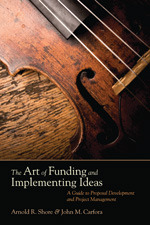The Art of Funding and Implementing Ideas
A Guide to Proposal Development and Project Management
- Arnold R. Shore - Boston College, USA
- John M. Carfora - Loyola Marymount University, Los Angeles, CA
Research Methods (General) | Scholarly Aids/Research Tools | Study Skills (Academic)
"Develop their starting ideas to the fullest
"Find sources of support that intersect most appropriately with their core interests
"Write a proposal that builds systematically on their ideas and interests and makes a beginning contribution to knowledge
"Conduct the project with innovative guidelines on project management that help the PI and the project team participate in and experience the excitement of bringing a research project to life
"This book will be of significant value to quite a few doctoral students and faculty members, especially in the arts, humanities, the less experimental social sciences and related professional schools."
The book did not offer enough practical exercises and field examples to support class structure.
This text is too heavily focused on the hard sciences. I would like to see a similar text for Arts and Humanities researchers.
Of the books I reviewed on grant writing, this was the most current and the most appropriate for my law and policy class. The focus of the book was broad in scope and was not written just for educators. I will use this with the coley text. I will use a different grant book for my education classes.


